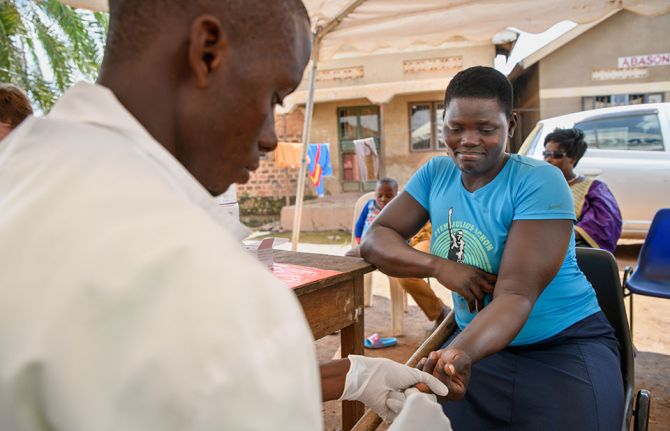

Feature Story
Positive Women with Disabilities in Uganda puts people at the centre during COVID-19 pandemic
29 March 2021
29 March 2021 29 March 2021The World Health Organization estimates that, globally, more than 1 billion people (15% of the world’s population) have a disability. Disability is increasing in prevalence due to ageing populations, trauma, accidents and chronic health conditions, including HIV, tuberculosis (TB) and COVID-19.
Persistent discrimination against and exclusion of people with disabilities, in particular women and girls with disabilities, increases their vulnerability, including their risk of HIV infection. People with disabilities, in particular women and girls with disabilities, also experience barriers to accessing HIV services and are left behind in HIV policy-planning, programme development, service delivery and data collection.
People with disabilities face stigma and discrimination in families and communities, lack transport to health-care facilities and are faced with poor attitudes of health workers while seeking health care.
Since 2004, the AIDS Service Organization (TASO), based in the Mulago Hospital Complex in Kampala, Uganda, has attempted to reach out to people with disabilities. However, it has had limited success due to the complexities of community-based care.
In 2016, in response to these challenges, Positive Women with Disabilities (POWODU) was formed out of TASO to pay special attention to people with disabilities living with HIV in order to reduce AIDS- and TB-related deaths, stigma and discrimination and to promote sexual and reproductive health and rights.
POWODU is headed by Betty Kwagala, a formidable advocate, trainer and woman living with HIV who has 25 years’ experience serving as a counsellor at TASO Mulago. Ms Kwagala is a respected and well-known figure in the community, who has uplifted the lives of many people living with HIV in Uganda.
POWODU, in partnership with TASO Mulago, reaches out to people with disabilities in the urban districts of Kampala, Wakiso and Mukono. According to TASO’s client register, there are more than 13 000 people with disabilities in Kampala and Wakiso enrolled into HIV care. Seventy per cent are women and the majority are homeless.
HIV testing and TB screening are integrated into every POWODU community outreach. “The services are always offered near to where people with disabilities reside because of mobility and transport challenges,” says Ms Kwagala.
If a client tests positive for HIV, POWODU offers immediate initiation of HIV treatment, as per the Ministry of Health guidelines. If a sputum TB test is positive, POWODU will refer the case to the main laboratory for further investigation and proper management. POWODU will then follow up, and, with the support of a TB focal person, arrange pick up for the client in a TASO van to escort him or her to receive the appropriate health service.
Other services offered on site by POWODU include sensitization on adherence to both HIV and TB treatment, prevention of HIV, TB and COVID-19 and accurate information on sexual and reproductive health and rights among people with disabilities.
“The COVID-19 pandemic has led to clients who have been lost to follow-up because they are homeless or reside in informal settlements. The lockdown caused more challenges, such as lack of food and a significant disruption to the usual activities that give them some income, such as begging,” says Ms Kwagala.
During the COVID-19 lockdown, UNAIDS supported 200 people with disabilities living with HIV with food rations, personal protective equipment and personal hygiene kits. It also supported a project to equip 40 people with disabilities with skills on how to identify income-generating activities. They were provided with popcorn-making machines and groundnut grinders.
TASO members were provided with megaphones and sensitized members of their communities on HIV, TB, COVID-19, sexual and reproductive health and gender-based violence.
“POWUDU and TASO have shown remarkable resilience by putting people at the centre during the COVID-19 pandemic by ensuring that people with disabilities living with HIV are safe and not left behind,” says Jotham Mubangizi, UNAIDS Country Director, a.i., for Uganda.


